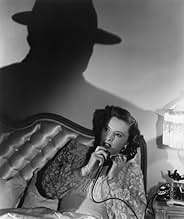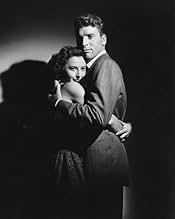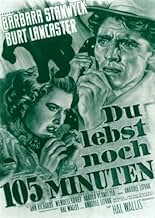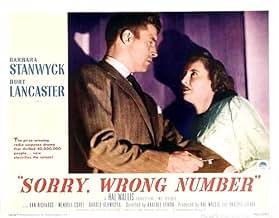When neurotic bedridden wife Leona Stevenson overhears a murder plot on her telephone, she tries to piece the puzzle together and prevent the murder. Based on Lucille Fletcher's famous radio... Read allWhen neurotic bedridden wife Leona Stevenson overhears a murder plot on her telephone, she tries to piece the puzzle together and prevent the murder. Based on Lucille Fletcher's famous radio play.When neurotic bedridden wife Leona Stevenson overhears a murder plot on her telephone, she tries to piece the puzzle together and prevent the murder. Based on Lucille Fletcher's famous radio play.
- Nominated for 1 Oscar
- 3 wins & 3 nominations total
- Page Boy
- (uncredited)
- Police Sergeant Duffy
- (uncredited)
- Cotterell's Blonde Girlfriend
- (uncredited)
- Clam Digger
- (uncredited)
- French Maid
- (uncredited)
- Cigarette Girl
- (uncredited)
Featured reviews
The idea of only gradually revealing why Leona is being set up for murder is a good one. It adds to the suspense—not just a 'when' but also a 'why'. The trouble is the disclosure is only revealed in pieces over the phone using flashbacks, and these are hard to piece together over a stretch of time. But enough comes through that we get the idea. There's some great noir photography from Sol Polito that really adds to the tense atmosphere. Anyhow, it's a great premise that also played well over the radio that I recall as a kid. It's also a subtle irony that one could end up being so alone in the middle of a great city. Poor Leona, maybe if she had been a little nicer and less bossy over the phone, she might have made the human connection she needed.
The Irony is that Sorry, Wrong Number is far from her finest hour on screen. Rarely has one been made so aware of Stanwyck `acting' in the most unabashedly actressy way. And the same can be said of Burt Lancaster who, when a role didn't set well with him, communicated his discomfort blatantly. In The Rose Tattoo, against Anna Magnani, he was ingratiating and unconvincing ; here, he's almost as awkward as the henpecked husband in whom the worm has at long last turned.
But maybe Fletcher's slice of devil's food cake calls for mannered histrionics. Ensconced in her bedchamber one sweltering Manhattan evening, her pill bottles and her telephone at her elbow, Stanwyck eavesdrops on a sinister conversation a murder is being plotted thanks to a crossed line. This makes her even more restive, and she starts working the phone, tracking down her tardy husband. Litvak `ventilates' these calls, turning them into a series of flashbacks filling in the background to what will prove a very bad evening for Stanwyck. (The sequences on Staten Island, however, could have sprung from the pen of Franklin W. Dixon, the Hardy Boys' puppeteer.)
Unavoidably talky, owing to its source, Sorry, Wrong Number moves inexorably to its preordained end. Basically, it's a gimmick, and one that Hitchcock might have fine-tuned into a nifty infernal machine. Litvak doesn't do badly, though, and the movie's shock value outlasts its staled conventions. Its most chilling moment comes when Stanwyck frantically dials a number that she thinks will give her solace. But her answer is `BOwery 2-1000 the City Morgue.'
Apart from the flashbacks, which epitomise the film noir tropes of the late forties, this film is Barbara Stanwyck alone and scared and trapped in her trappings of wealth. She's confined in the physical and mental luxury jail cell she's made for herself. It's an exceptional performance of a woman in despair driven to the edge, of knowing something awful is about to happen but not being able to do anything about it. It's a perfect example of how a film can stretch out tension and suspense tighter and more intense with each passing minute.
And I also loved it when in one of the flashbacks, Fred shouts to his wife: Hey Sally, Joe wants a bottle of beer and she obligingly dashes out to the shop: oh how 1940s!
You can tell this thriller was once a radio play--it is mostly talk, and often over the telephone. But what drama can be built on a string of conversations around the office, in cars in the rain, out on a lonely beach on Staten Island, and on the telephone, often filled with mystery and doom.\
Not that it's not a visual movie, either. There is a big gloomy house, and lots of dark city streets. Shadows and moving camera and close-ups of faces and telephones, all keep you glued and increasingly worried. By the end, the really jarring, memorable end, you are ready for what you can never be ready for.
Beware, the plot is confusing. Even seeing it twice I had to pay attention to who was who, and what turn of events had just taken place. Part of the reason is there is a bewildering use of flashbacks, even flashbacks within flashbacks, told by all kinds of different characters. The plot is laid out methodically, but take notes as you go, or at least take note. The initial overheard phone call is key to it all, and it gets reinforced later somewhat, but pay heed there.
And the person on the phone? A sharp, bitter, convincing Barbara Stanwyck, who really knows how to be steely and vulnerable at the same time. Burt Lancaster is more solid and stolid, and maybe less persuasive overall, but he carries a more practical part of the story. It keeps coming back to Stanwyck in bed, and the telephone which is her contact with the facts, as they swirl and finally descend.
Director Anatole Litvak has some less known but thrilling dark dramas to look for, including Snake Pit. But this is his most sensational winner, partly for Stanwyck, and partly for the last five minutes, which is as good as drama gets.
Sympathy builds for this unlikeable woman, Leona, played by Barbara Stanwyck. She is a spoiled heiress used to getting her own way, but as we come to see, very much created by her father (played by Ed Begley) who bows to all her wishes.
Her husband, Henry, played by Burt Lancaster, whom she chases and captures from her best friend, initially goes along with being an employee in her father's corporation but eventually starts chafing at the restraints imposed on him.
The movie just about plays in real time with the addition of many flashbacks, one of which secures the knowledge that there is nothing wrong with Leona, it is all psychosomatic based on her mother's fatal illness.
From the moment Leona accidentally overhears a plotted murder for later on that evening, the viewer is taken on a ride that builds suspense and tension to a terrifying conclusion and the movie's title.
Not to be missed. The cinematography is superb, a lot of play in light and shade. Barbara deserved an Oscar but lost. 8 out of 10.
Did you know
- TriviaAnatole Litvak: When Henry is having lunch with Sally, he asks the waiter if he knows who the gentleman is in the dark glasses at the table behind him. It's the director of the film.
- GoofsTwice, Leona turns on a radio, and music begins instantly and strongly. Radios of the film's era contained vacuum tubes that needed some time to warm up.
However, this would be filmmaker's prerogative, not wanting to slow the pace of the film with extended silence.
- Quotes
Henry Stevenson: [to Leona] I want you to do something. I want you to get yourself out of the bed, and get over to the window and scream as loud as you can. Otherwise you only have another three minutes to live.
- Crazy creditsPROLOGUE: "In the tangled networks of a great city, the telephone is the unseen link between a million lives...It is the servant of our common needs-the confidante of our inmost secrets...life and happiness wait upon its ring...and horror...and loneliness...and...death!!!"
- ConnectionsEdited into Les cadavres ne portent pas de costard (1982)
- How long is Sorry, Wrong Number?Powered by Alexa
Details
- Release date
- Country of origin
- Language
- Also known as
- Al filo de la noche
- Filming locations
- Hollywood, California, USA(telephone switchboard at a telephone company office on Gower St.)
- Production company
- See more company credits at IMDbPro
Box office
- Gross worldwide
- $1,974
- Runtime
- 1h 29m(89 min)
- Color
- Aspect ratio
- 1.37 : 1




































